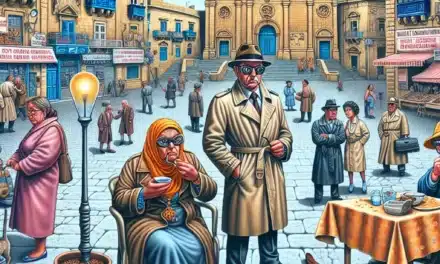The Mysterious Case of the Misplaced Għana Singer
Chaotic Beginnings in the Heart of Valletta
It was an unusually hot day in Valletta, the sort of day when the tar melts on Republic Street and tourists mistake the mirage puddles for the Mediterranean Sea. Amid the sweating crowd, Constable Karmnu, with a cream-colored uniform stuck to his back like pastizzi pastry, pursed his lips. He had just received an odd report: a local għana singer, Ċikku l-Poplu, famous for serenading tourists with his vibrant luzzu-painted voice, was missing—only his tambourine remained, spinning slowly on the sun-baked flagstones near St. John’s Co-Cathedral.
Unlikely Heroes: A Motley Crew from Three Villages
Three local characters, savvy to the twisted alleyways of Maltese life, volunteered to find Ċikku. From the historic citadel of Mdina came Rita, a formidable tal-ħobża who knew everyone’s business better than her own. Joining her was Spiro, a Gozo ferry captain with a penchant for conspiracy theories and seasickness on land. Lastly, Frans, a Mosta dome painter, whose rotund silhouette was surpassed only by his colossal knack for sniffing out a feast—ħobż biż-żejt being his preferred tracking device.
A Tangled Web of Clues
Our trio’s investigation led them first to the nearest fenkata joint, where Ċikku was rumored to perform impromptu ballads for an extra helping of rabbit stew. But instead of finding the plump singer, they stumbled into a hilarious feast of overcooked lies.
“Uwejja! Do you honestly believe Ċikku would skip his favourite fenkata for a simple stroll?” Rita exclaimed, eyeing the suspiciously silent waiter who had attempted to serve them a sangweech without fries.
The waiter’s mustache twitched like the tail of a Maltese cat, and his silence spoke louder than the Cathedral’s bells. With Rita’s unrelenting gaze, the waiter caved and divulged that Ċikku was last seen boarding a dgħajsa, whispering about a secret serenade at Fort St. Angelo.
A Serenade Gone South
Following the fishy lead, they arrived at the Grand Harbour. But unlike the tranquil postcards, chaos reigned supreme as a tourist flotilla had been gated by swans, mistaking pedal boats for giant bread loafs. Amid the commotion, Spiro’s inside scoop on maritime mishap proved invaluable.
“I heard from a seagull that Ċikku never disembarked. He only sang a ballad so sad that even the barnacles wept!” Spiro said, navigating through the feathery blockade with Frans’ supply of ħobż biż-żejt as swan bait.
They found the dgħajsa bobbing beside the fort, empty but for a recording of Ċikku’s melancholic malady. Through the soppy lyrics about lost love and vanished Twistees packets, they pieced together the ultimate twist: Ċikku eloped with a sassy tan-Nanna souvenir shop owner!
The Surprise Wedding of the Century
The mystery culminated with the trio crashing Ċikku’s unconventional wedding inside the ‘Mdina Dungeons,’ where the betrothed professed eternal love amidst faux medieval torture devices.
“Mela, this explains everything! Our Ċikku didn’t vanish; he was simply orchestrating the most dramatic għana duet Mdina has ever witnessed!” Rita said, her skepticism melting into mirth at the sight.
The news spread like wildfire through social media posts, mockumentary clips, and of course, the ‘Times of Mela.’ The island buzzed with this romantic escape, and jokes soared about singing your way out of trouble in Malta. For Constable Karmnu, the case closed on a high note, and for Rita, Spiro, and Frans, returning to normal life meant a return to a Maltese reality—that everyone needed a good laugh, and perhaps, a hearty feast after all the sleuthing.
Where to Find the Best Ħobż Biż-Żejt:
- Valletta’s ‘Ħobż Bizu’ Kiosk
- The ‘Rustic Crunch’ in Mdina
- ‘Gozo Deli Delights’ by the Ferry Terminal
In the end, Ċikku’s wedding was more celebrated than the fireworks at the Gozo carnival. His disappearance and the twists turned legend, and every year on the anniversary, locals and tourists alike hunt for tambourines, hoping to spot the next great Maltese love story—or at least enjoy some delicious ħobż biż-żejt.







Recent Comments